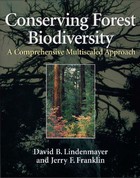
While most efforts at biodiversity conservation have focused primarily on protected areas and reserves, the unprotected lands surrounding those area—the "matrix"—are equally important to preserving global biodiversity and maintaining forest health. In Conserving Forest Biodiversity, leading forest scientists David B. Lindenmayer and Jerry F. Franklin argue that the conservation of forest biodiversity requires a comprehensive and multiscaled approach that includes both reserve and nonreserve areas. They lay the foundations for such a strategy, bringing together the latest scientific information on landscape ecology, forestry, conservation biology, and related disciplines as they examine:
- the importance of the matrix in key areas of ecology such as metapopulation dynamics, habitat fragmentation, and landscape connectivity
- general principles for matrix management
- using natural disturbance regimes to guide human disturbance
- landscape-level and stand-level elements of matrix management
- the role of adaptive management and monitoring
- social dimensions and tensions in implementing matrix-based forest management
Conserving Forest Biodiversity presents strategies for enhancing matrix management that can play a vital role in the development of more effective approaches to maintaining forest biodiversity. It examines the key issues and gives practical guidelines for sustained forest management, highlighting the critical role of the matrix for scientists, managers, decisionmakers, and other stakeholders involved in efforts to sustain biodiversity and ecosystem processes in forest landscapes.

- synthesizes a large body of information from the scientific literature
- considers key theoretical principles for examining and predicting effects
- examines the range of effects that can arise
- explores ways of mitigating impacts
- reviews approaches to studying the problem
- discusses knowledge gaps and future areas for research and management

Salvage Logging and Its Ecological Consequences brings together three leading experts on forest ecology to explore a wide range of issues surrounding the practice of salvage logging. They gather and synthesize the latest research and information about its economic and ecological costs and benefits, and consider the impacts of salvage logging on ecosystem processes and biodiversity. The book examines
• what salvage logging is and why it is controversial
• natural and human disturbance regimes in forested ecosystems
• differences between salvage harvesting and traditional timber harvesting
• scientifically documented ecological impacts of salvage operations
• the importance of land management objectives in determining appropriate post-disturbance interventions
Brief case studies from around the world highlight a variety of projects, including operations that have followed wildfires, storms, volcanic eruptions, and insect infestations. In the final chapter, the authors discuss policy management implications and offer prescriptions for mitigating the impacts of future salvage harvesting efforts.
Salvage Logging and Its Ecological Consequences is a “must-read” volume for policymakers, students, academics, practitioners, and professionals involved in all aspects of forest management, natural resource planning, and forest conservation.

The world's montane forests are vitally important for conservation and water catchment. Because logging regimes have significant impacts on biodiversity as well as water quality and water quantity, the management of these forests has often been a major source of conflict amongst rural communities, government agencies, and conservationists. Although much information on ecologically sustainable managment practices is now available, further organizational change and policy tranformation is needed to see a transition to sustainable practices inplemented on the ground.
Towards Forest Sustainability contains practical essays by some of the world's leading forests ecologists and managers from the United States, Canada, Finland, Sweden, Australia, and New Zealand. The authors describe the changes that have taken place in forest management- highlighting what worked, what didn't, and the lessons that have been learned.
This unique collection of essays documents the drivers of the change in the logging industry and the resulting outcomes, both the good and the bad. The book provides real-world insights from an international perspective into government policy, industrial concerns, and conservation and biodiversity issues.
READERS
Browse our collection.
PUBLISHERS
See BiblioVault's publisher services.
STUDENT SERVICES
Files for college accessibility offices.
UChicago Accessibility Resources
home | accessibility | search | about | contact us
BiblioVault ® 2001 - 2025
The University of Chicago Press









